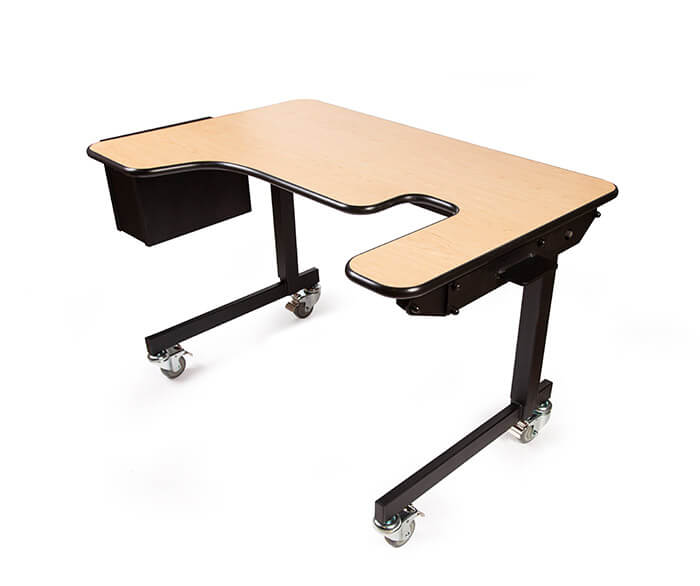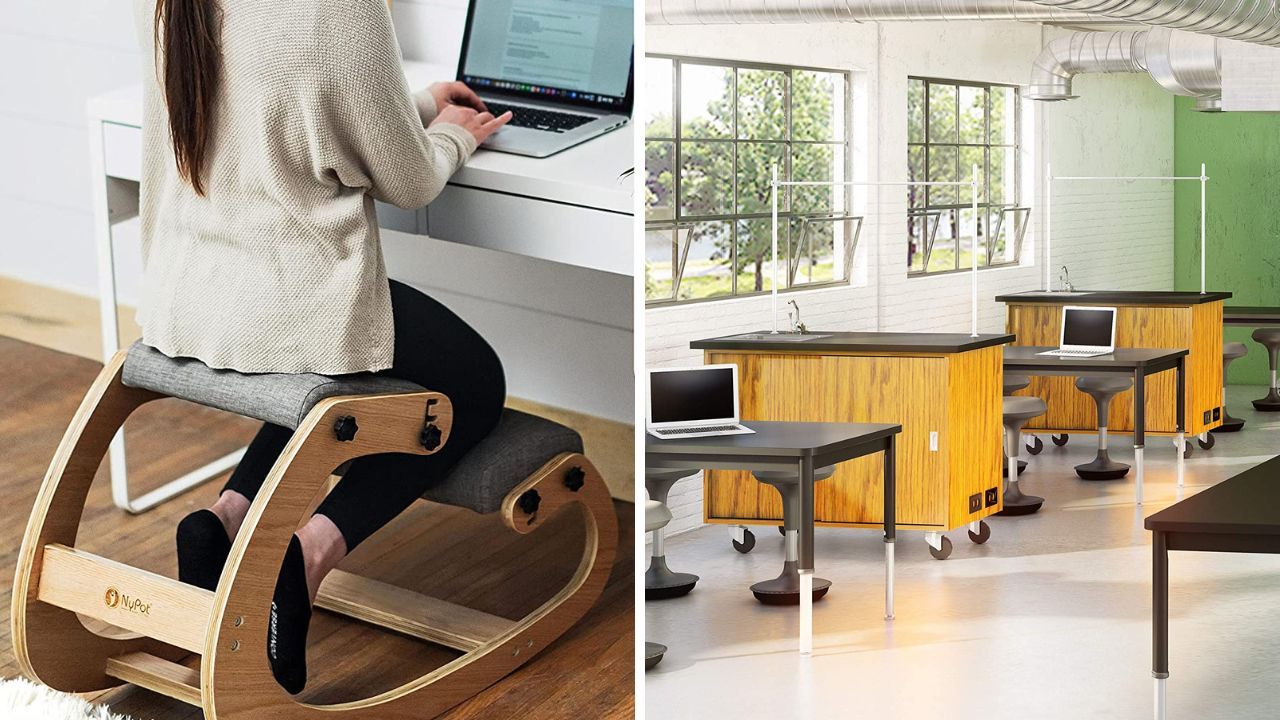Understanding Special Needs Desk Chairs

Special needs desk chair – For individuals with disabilities, a desk chair is more than just a piece of furniture; it’s a crucial tool for comfort, support, and independence. Finding the right chair can make a world of difference in their daily lives, enabling them to participate in activities, work productively, and enjoy a better quality of life.
Unique Needs and Challenges
Individuals with disabilities face a unique set of challenges when it comes to seating. These challenges can stem from physical limitations, sensory sensitivities, or cognitive impairments. For example, individuals with mobility impairments may require chairs with adjustable heights and armrests to facilitate easy transfers. Those with spinal cord injuries might need chairs with lumbar support to prevent back pain and promote proper posture. Sensory sensitivities can also play a role, with individuals requiring chairs with soft, breathable fabrics or specific textures to avoid discomfort or irritation.
Special needs desk chairs are designed to provide optimal support and adjustability for individuals with specific physical requirements. While these chairs often prioritize features like adjustable height, lumbar support, and armrests, some models also incorporate massage functionality, similar to a massaging office desk chair.
This can be particularly beneficial for individuals who experience pain or discomfort during prolonged sitting. By incorporating massage features, special needs desk chairs can promote circulation, reduce muscle tension, and enhance overall comfort for users.
Ergonomic Design and Adjustability
Ergonomic design and adjustability are essential features of special needs desk chairs. These features help ensure that the chair provides optimal support and comfort, reducing the risk of pain, fatigue, and injuries.
Special needs desk chairs are designed to provide optimal comfort and support for individuals with specific physical requirements. These chairs often feature adjustable features, such as seat height and backrest angle, to accommodate a wide range of body types and postures.
In addition to these adjustments, using a neck pillow for desk chair can further enhance comfort and reduce neck strain, particularly for those who spend extended periods sitting. By providing additional support and promoting proper posture, these specialized chairs and accessories can significantly improve the overall well-being of individuals with special needs.
- Adjustable Height: Allows users to find the perfect height for their desk and body, promoting good posture and reducing strain on the back and neck.
- Adjustable Backrest: Enables users to customize the backrest angle to provide optimal support for their back, reducing pressure points and promoting comfort.
- Adjustable Armrests: Allows users to position their arms at the correct height, reducing strain on the shoulders and wrists.
- Lumbar Support: Provides extra support for the lower back, helping to prevent pain and promote proper posture.
- Seat Depth and Width: Can be adjusted to accommodate different body types and provide optimal support for the thighs and hips.
Common Disabilities That Benefit From Specialized Seating Solutions, Special needs desk chair
Special needs desk chairs are designed to meet the unique requirements of individuals with a wide range of disabilities. Here are some examples of common disabilities that can benefit from specialized seating solutions:
- Cerebral Palsy: Individuals with cerebral palsy often have difficulty with balance, coordination, and muscle control. Special needs chairs with adjustable features and supportive cushions can help them maintain a stable and comfortable seating position.
- Spinal Cord Injuries: People with spinal cord injuries may experience weakness, paralysis, and sensory loss. Chairs with lumbar support, adjustable height, and armrests can provide the necessary support and comfort to prevent pain and promote proper posture.
- Autism Spectrum Disorder: Individuals with autism may have sensory sensitivities and difficulty with transitions. Chairs with soft, breathable fabrics and adjustable features can help them feel comfortable and secure in their environment.
- Down Syndrome: Individuals with Down syndrome often have joint laxity and muscle weakness. Chairs with adjustable features and supportive cushions can help them maintain a stable and comfortable seating position.
Types of Special Needs Desk Chairs

The world of special needs desk chairs is diverse, offering a range of options to cater to different needs and preferences. Understanding the various types available is crucial in selecting the most suitable chair for an individual. This section delves into the common types of special needs desk chairs, highlighting their key features, benefits, and drawbacks.
Types of Special Needs Desk Chairs
Different types of special needs desk chairs cater to a wide range of needs. The following table provides a comprehensive overview of common types, their features, and suitability:
| Type | Key Features | Suitability | Benefits | Drawbacks |
|—|—|—|—|—|
| Postural Support Chairs | Designed to promote proper posture, often featuring adjustable backrests, seat depth, and armrests. | Individuals with scoliosis, postural issues, or those requiring extra support. | Improved posture, reduced back pain, and enhanced comfort. | Can be restrictive for some users, may require adjustment to find the optimal fit. |
| Adaptive Chairs | Offer customizable features like adjustable height, tilt functionality, and specialized seating surfaces. | Individuals with mobility limitations, limited range of motion, or specific medical needs. | Increased accessibility, improved comfort, and reduced pressure points. | Can be expensive, may require professional fitting, and may have limited adjustability. |
| Weighted Chairs | Provide deep pressure stimulation through the use of weights incorporated into the chair’s design. | Individuals with sensory processing disorders, autism, or anxiety. | Calming effect, reduced anxiety, and improved focus. | May not be suitable for all individuals, can be heavy and difficult to move. |
| Active Seating Chairs | Encourage movement and engagement by incorporating features like rocking bases, adjustable angles, or inflatable cushions. | Individuals who need to stay active during prolonged sitting, those with ADHD, or those prone to fidgeting. | Improved blood circulation, increased focus, and reduced restlessness. | May not be suitable for individuals with balance issues, can be distracting for some. |
Choosing the Right Special Needs Desk Chair

Choosing the right special needs desk chair is crucial for ensuring comfort, support, and independence for individuals with diverse needs. A well-chosen chair can make a significant difference in their ability to participate in daily activities, including schoolwork, work, and leisure.
Factors to Consider When Choosing a Special Needs Desk Chair
A comprehensive evaluation of the user’s needs is essential before selecting a special needs desk chair. Several factors contribute to making the right choice.
- Age: Age plays a crucial role in determining the chair’s features and functionality. Younger children may require adjustable chairs that grow with them, while adults may need more specialized features to address specific needs. For example, a child with cerebral palsy might benefit from a chair with adjustable seat depth and height, while an adult with spinal cord injury might require a chair with a tilt-in-space function.
- Disability: Understanding the user’s disability is paramount in selecting a chair that addresses their specific needs. For instance, a child with autism spectrum disorder might benefit from a chair with sensory features, such as a weighted cushion or a textured backrest, to promote calm and focus. An adult with multiple sclerosis might need a chair with adjustable lumbar support to provide comfort and reduce fatigue.
- Height and Weight: The chair’s size and weight capacity must accommodate the user’s physical dimensions. An oversized chair might be uncomfortable and hinder mobility, while a chair with insufficient weight capacity can pose safety risks. For instance, a child with dwarfism might require a chair with a lower seat height and adjustable footrests, while an adult with obesity might need a chair with a higher weight capacity.
- Activity Level: The chair’s functionality should align with the user’s activity level. Individuals with high activity levels might benefit from chairs with adjustable armrests, footrests, and tilt-in-space functions, allowing for frequent position changes and promoting comfort. Conversely, individuals with low activity levels might require chairs with stable bases and locking features to prevent accidental movements.
- User Preferences: It is essential to consider the user’s preferences, such as their preferred seating position, fabric choices, and color schemes. For instance, some individuals might prefer chairs with soft cushions and adjustable lumbar support, while others might prefer firmer seating with adjustable armrests. Taking these preferences into account ensures the chair is comfortable and enjoyable to use.
Comparing Different Brands and Models
The market offers a wide range of special needs desk chairs, each with unique features and benefits. Comparing different brands and models based on key features, price, and user reviews can help you make an informed decision.
| Brand | Model | Features | Price | User Reviews |
|---|---|---|---|---|
| Sunrise Medical | Quickie Tango | Adjustable seat depth, height, and tilt, customizable options, durable construction | $2,000 – $3,000 | 4.5 stars (based on 100 reviews) |
| Permobil | F5 Corpus | Tilt-in-space function, adjustable backrest and headrest, multiple seating options, advanced customization | $3,000 – $4,000 | 4.7 stars (based on 75 reviews) |
| TiLite | Aero 2.0 | Lightweight and maneuverable, adjustable seat depth and height, customizable options, durable construction | $1,500 – $2,500 | 4.3 stars (based on 150 reviews) |
| Action Seating | Action 5000 | Adjustable seat depth, height, and tilt, customizable options, durable construction, affordable price | $1,000 – $2,000 | 4.1 stars (based on 200 reviews) |